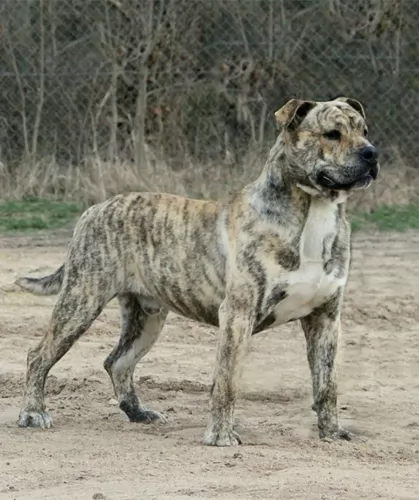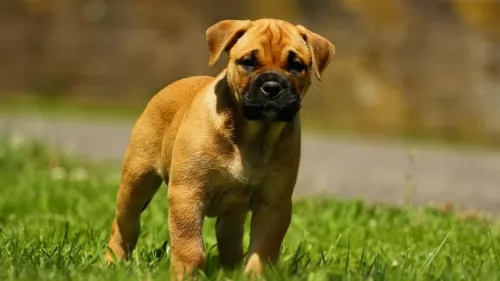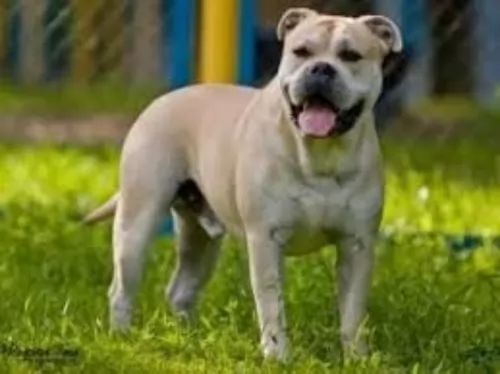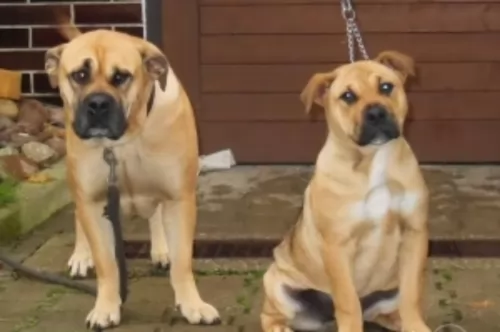 Petzlover
Petzlover Perro de Presa Mallorquin is originated from Spain but Mudi is originated from Hungary. Perro de Presa Mallorquin may grow 11 cm / 5 inches higher than Mudi. Perro de Presa Mallorquin may weigh 25 kg / 56 pounds more than Mudi. Both Perro de Presa Mallorquin and Mudi has almost same life span. Perro de Presa Mallorquin may have less litter size than Mudi. Perro de Presa Mallorquin requires Low Maintenance. But Mudi requires Moderate Maintenance
Perro de Presa Mallorquin is originated from Spain but Mudi is originated from Hungary. Perro de Presa Mallorquin may grow 11 cm / 5 inches higher than Mudi. Perro de Presa Mallorquin may weigh 25 kg / 56 pounds more than Mudi. Both Perro de Presa Mallorquin and Mudi has almost same life span. Perro de Presa Mallorquin may have less litter size than Mudi. Perro de Presa Mallorquin requires Low Maintenance. But Mudi requires Moderate Maintenance
 Known by several other names such as Majorca Mastiff, Perro Dogo, Ca de Bou and Mallorquin Bulldog among others, the Perro de Presa Mallorquin was almost extinct after World War II.
Known by several other names such as Majorca Mastiff, Perro Dogo, Ca de Bou and Mallorquin Bulldog among others, the Perro de Presa Mallorquin was almost extinct after World War II.
The British brought their own dogs with them into the Balearics, crossing them with native mastiffs. They were used for fighting, explaining why this dog also got the name Ca de Bou as it means Bull Dog.
It is believed that the dogs were crossed with the Perro de Pastor Mallorquin, Alano Espanol and the Bulldog.
 Sometime between the 4th and 6th centuries, the Great Migration – a variety of dogs came to live in the Carpathian Mountains on the Great Hungarian Plain. This migration period brought sheepdogs and herders brought by shepherds. These dogs were of two sizes both small and large. The smaller ones were bred together – Pumi, Puli, and Mudi. Because of this, these breeds share the same history, with the Mundi being the oldest of them all.
Sometime between the 4th and 6th centuries, the Great Migration – a variety of dogs came to live in the Carpathian Mountains on the Great Hungarian Plain. This migration period brought sheepdogs and herders brought by shepherds. These dogs were of two sizes both small and large. The smaller ones were bred together – Pumi, Puli, and Mudi. Because of this, these breeds share the same history, with the Mundi being the oldest of them all.
The Mundi was finally separated from the other breeds about 1930 when Dr. Deszo Fenyesi began to breed them. It was in 1966 when the F.C.I. finally approved the standard for the breed. Still then as today, there were not many breeders developing the Mudi. They are working dogs – farm dogs – herders, guard dogs and ratters. He is also known as a tracker, with the majority of the breed living in Hungary.
As the Mudi was bred separately from the Pumi and the Puli, differences between the breeds became clear. Many Mudi are born with a stump or no tail at all. The Mudi is not a great dog for the first timer. He is stubborn, assertive and needs a lot of socialization and exercise. In 2004 breeders in the United States created the Mudi Club of America to preserve the breed and foster responsible ownership. This is a clever, active and keen breed, very loyal to his family but wary of strangers. The United Kennel Club recognized the breed in 2006.
In Hungary, these are still a breed of herding dogs capable of running 500 sheep at a time. They are versatile, courageous, intelligent and agile. They are great in obedience trials, agility, and flyball. In Finland and the United States, they also work as search and rescue dogs.
 The Perro de Presa Mallorquin is a strong medium-to-large sized deep chested dog standing at between 52 and 58cm in height and weighing between 30 and 39kg, both male and female.
The Perro de Presa Mallorquin is a strong medium-to-large sized deep chested dog standing at between 52 and 58cm in height and weighing between 30 and 39kg, both male and female.
This is a molosser-type dog with a strong, powerful build and large head. The skin around the face is thick and loose. The coat of the dog is short and rough and the color is fawn to light brown and reddish tan shade He can also be brindle too or black with tan markings.
The jaw is strong, the ears short and floppy though they have always been traditionally cropped. When left they can be folded backward. The tail is long, set low and reaches to the hock.
This is an intelligent dog who is going to require training and socialization if you want to manage it properly. Training and socializing a dog can be very helpful and help a dog like this to be more obedient and well behaved.
As a puppy growing up with kids who have been taught to treat animals kindly and with respect, the Perro de Presa Mallorquin can get on well with children. However, if you’re bringing an older dog into your home, the very nature of the dog may mean it not getting on with children.
This dog is quiet by nature and will be loving and loyal towards his owner, being protective towards him. He is strong-willed and will do best with a strong, firm, kind, patient dog owner who is consistent.
He is active and will fit into life in the suburbs or the countryside as opposed to life on a tiny property in the city.
 This is a medium size dog with an almost square profile. They have erect ears on wedge-shaped heads. He is not a strong boned but medium boned. That square profile is based in large part on their very square stance. Their muzzle is about half the length of their head and they have what is considered a “dare devil” expression in their dark, almond-shaped eyes. The color of the eyes is important and must match with the color of the dog or the standard is not met.
This is a medium size dog with an almost square profile. They have erect ears on wedge-shaped heads. He is not a strong boned but medium boned. That square profile is based in large part on their very square stance. Their muzzle is about half the length of their head and they have what is considered a “dare devil” expression in their dark, almond-shaped eyes. The color of the eyes is important and must match with the color of the dog or the standard is not met.
Merle fur – brown, brown speckled, blue eyes.
Brown or gray-brown fur – Brown eyes
Gray fur – gray eyes
What is not acceptable is having yellow eyes and black fur; pink eyes and white fur. The lips, eye rims, and nose must all have the same pigmentation. This should be black in all but the brown and brown-grey dogs. These dogs have brown noses, eye rims, and lips. The tail can be almost anything from full to bob. All are considered to be natural lengths for a Mudi.
Their coat is self-cleaning and won’t mat. It is on the long side. In fact, a short, flat, smooth coat is a disqualification from the standard. The color of the coat ranges from white to brown to gray, gray-brown, merle, golden, cream and white. Very little markings of any kind are usual.
 Your Perro de Presa Mallorquin is a loving dog, albeit it a bit stubborn. The key to having a dog with a sound temperament is to have him trained and socialized as this will do him the world of good and make him obedient and more balanced.
Your Perro de Presa Mallorquin is a loving dog, albeit it a bit stubborn. The key to having a dog with a sound temperament is to have him trained and socialized as this will do him the world of good and make him obedient and more balanced.
Irresponsible dog owners like to tie dogs like this up and leave them in the yard day after day to guard the home. They’re to blame when the dog becomes bored, frustrated and destructive.
Brought up correctly and given the right amount of love and care, the Perro de Presa Mallorquin is a brave, confident, quiet dog that can become a loyal and loving pet and companion.
 Yes, they are great with children and love being a part of a large family or “pack”.
Yes, they are great with children and love being a part of a large family or “pack”.
They are extremely versatile and great at herding and guarding.
They are adaptable if you are. They don’t need to live in the country, but they need space to run and play.
They are highly intelligent but a little stubborn. Their ability to learn is high but you have to be the boss.
 To avoid some of the common dog illnesses there are, you want to give your pet the best care possible. Of course there are always some dog illnesses that plague a dog and where he will require veterinary intervention. Hip dysplasia is one and larger dogs are more prone to getting this joint disease which can be very debilitating for your dog.
To avoid some of the common dog illnesses there are, you want to give your pet the best care possible. Of course there are always some dog illnesses that plague a dog and where he will require veterinary intervention. Hip dysplasia is one and larger dogs are more prone to getting this joint disease which can be very debilitating for your dog.
Other health issues can include osteosarcoma and lymphoma which are types of cancer Eye problems such as ectropion or entropion of the eyelids is where you'll find the eyelids turning either outwards or inwards. Also be aware of cataracts of the eyes as well as Cherry eye.
 The Mudi does face several of the problems that medium to large dogs often face and some eye issues as well.
The Mudi does face several of the problems that medium to large dogs often face and some eye issues as well.
 Your Perro de Presa Mallorquin is going to need a walk every day if you want him to be physically and mentally sound. He loves to sniff around and see the world beyond his garden.
Your Perro de Presa Mallorquin is going to need a walk every day if you want him to be physically and mentally sound. He loves to sniff around and see the world beyond his garden.
This is a low maintenance breed, requiring a brush twice a week just to maintain the coat in its heathy state and to remove loose hairs.
This purebred dog will need an adequate diet to keep him in tip top shape. He likes his food and because he is big and energetic, will require commercially manufactured dog food that is high in good quality protein. In fact always check the packaging that protein sources are among the top ingredients listed.
Growing puppies will require 4 helpings of food a day which can later become 2 meals a day.Try to include some home-made food for him. It doesn’t have to be complicated, in fact dogs want simplicity and consistency with their food so that they don’t get upset stomachs.
Boiled chicken, brown rice or pasta and cooked vegetables such as sweet potato, carrots and spinach chopped up and added into the kibble occasionally can be a wonderful tasty treat for your pet. It is also a good idea to try and give him some raw meat from time to time as well.
Avoid all spicy, unusual foods for your pet – he doesn’t want any surprises when it comes to his food. Ensure he always has a bowl of fresh, cool water available.
 The Mudi needs a high quality, medium breed puppy dry food and should be fed 3 or 4 times a day for a total of 1 and ½ to 2 cups.
The Mudi needs a high quality, medium breed puppy dry food and should be fed 3 or 4 times a day for a total of 1 and ½ to 2 cups.
The adult should be fed at least twice a day with an adult medium breed high-quality dry dog food. Don’t overfeed as the breed can have a tendency toward obesity.
They have great stamina and agility.
This is a working dog and like most herding dogs, they need a job and a lot of activity. Long walks every day and either a large yard or visits to a dog park. Involve them in herding activities or Barn Hunt if you can. Playing is their way of working when they are not herding real animals. So, if you want this breed, be sure you have time for playing with them. They are great at agility, flyball, obedience, frisbee trials, tracking and of course herding